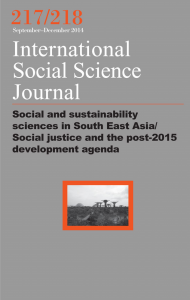Creating or Identifying Mental Illness: what American psychiatric definitions of illness do

The New York Times Sunday Magazine featured an article (a preview of a book) by Ethan Watters about the globalization of American concepts of mental illness (linked below). In short, along with our flavored lattes, burgers and GAP jeans, American concepts of illness are spreading across the globe. I would argue they have spread and are relatively well-integrated into the majority of societies’ understandings of a wide range of symptoms. There are very few places untouched by American conceptualizations of mental disorders, particularly those of the American Psychiatric Association. Relatively ignored in this shortened version of Watters’s argument are the contributions of Sociologists of mental health in describing the construction of illness and how illness conceptualizations/categories spread and affect both individuals diagnosed with the myriad psychiatric conditions now considered biological disorders by American Psychiatry as well as cultures and societies more generally once these concepts become commonly accepted.
For decades, sociologists of mental health have focused on the the ways in which certain symptoms come to be classified as disorders and how psychiatry has become the discipline considered to be the legitimate conceptualizers of these conditions. Allan Horwitz, for example, has been particularly influential in this debate (see the article below). Medications for treating these illnesses are also centrally implicated in these illness definitions. Further, as mentioned in the Times article, though not attributed to sociological research, sociologists have also noted the complex question of whether American criteria for psychiatric illness are being used to diagnose illness across the globe where it had been previously been ignored or whether these criteria are in fact creating illness where it did not exist before by providing cultures previously unexposed to knowledge of, for instance, depression symptomatology. In other words, are we exposing illness where it had been previously been ignored or are we creating illness by imposing our illness categories on societies where the same symptoms we see in the US were not around until our categories hit the scene?
This phenomenon is embodied most clearly in the fact that the Diagnostic and Statistical Manual of Mental Disorders, published by the American Psychiatric Association and used by most mental health professionals to diagnose mental illness, is now also the central criteria for the ICD 9 scale used by the world health organization in diagnosing illness. Even within the US, the same debate exists – for instance, some studies show that second generation immigrants to the US are much more likely to experience symptoms of depression than their first generation counterparts. Is it because first generation immigrants just don’t have as much illness or is it because second generation immigrants have been exposed to the American conceptualizations of illness and are presenting with different symptoms? In sum, our concepts of illness have an effect on people – both at home and abroad. Ultimately, it is not known whether we are helping people who would otherwise not be getting treatment, as they never would have been identified as ill OR whether we’re creating illness where it did not exist before and importing treatment measures that may not be more effective than those that already existed in a given society or culture – and perhaps even importing stigma, as the Times article suggests, about a range of conditions, especially the most severe illnesses such as schizophrenia. Certainly, sociologists such as Jo Phelan have suggested that the biologicization, particularly the “geneticization” of mental illness can both remove as well as further stigma, which is an important area for further research. While this article focuses on the progress and pitfalls associated specifically with biological conceptualizations of mental illness, the larger question of how the exporting of American illness categories, be they biological or otherwise, will influence societies across the globe – and even how these concepts influence our own citizens.
![]() The Americanization of Mental Illness
The Americanization of Mental Illness
![]() DSM III and the Revolution in the Classification of Mental Illness
DSM III and the Revolution in the Classification of Mental Illness





1728-4457/asset/PopulationCouncilLogo.jpg?v=1&s=03074651676b98d6b9d0ef1234bd48fe7ff937c3)
This is a brilliant question: are we exposing illness where it had been previously been ignored or are we creating illness by imposing our illness categories on societies where the same symptoms we see in the US were not around until our categories hit the scene? I wonder what outcomes either of these effects produce in different contexts? Also, I wonder what testing has been done to see if these standardized instruments are relevant in multiple contexts? Already these are used in contexts within the US which might be appropriate (e.g. on Indian reservations). The potential for damaging outcomes seems great.
Keri